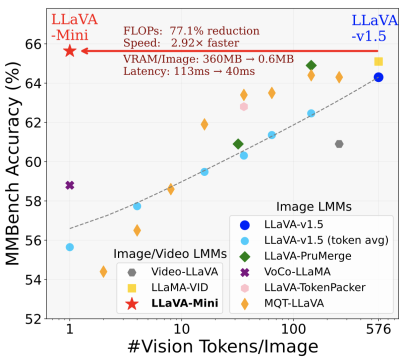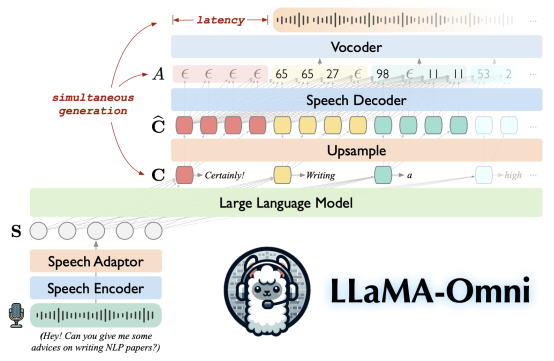In January 2025, NLP Group has 2 papers accepted by ICLR 2025. The full name of ICLR 2025 is the 13th International Conference on Learning Representations. ICLR, along with ICML and NeurIPS, are three of the most influential and widely followed conferences in the fields of machine learning and artificial intelligence. ICLR 2025 will be held in Singapore from April 24 to April 28, 2025.
A brief introduction to the accepted papers is as follows:
- LLaVA-Mini: Efficient Image and Video Large Multimodal Models with One Vision Token (Shaolei Zhang, Qingkai Fang, Zhe Yang, Yang Feng)
Abstract: The advent of real-time large multimodal models (LMMs) like GPT-4o has sparked considerable interest in efficient LMMs. LMM frameworks typically encode visual inputs into vision tokens (continuous representations) and integrate them and textual instructions into the context of large language models (LLMs), where large-scale parameters and numerous context tokens (predominantly vision tokens) result in substantial computational overhead. Previous efforts towards efficient LMMs always focus on replacing the LLM backbone with smaller models, while neglecting the crucial issue of token quantity. In this paper, we introduce LLaVA-Mini, an efficient LMM with minimal vision tokens. To achieve a high compression ratio of vision tokens while preserving visual information, we first analyze how LMMs understand vision tokens and find that most vision tokens only play a crucial role in the early layers of LLM backbone, where they mainly fuse visual information into text tokens. Building on this finding, LLaVA-Mini introduces modality pre-fusion to fuse visual information into text tokens in advance, thereby facilitating the extreme compression of vision tokens fed to LLM backbone into one token. LLaVA-Mini is a unified large multimodal model that can support the understanding of images, high-resolution images, and videos in an efficient manner. Experiments across 11 image-based and 7 video-based benchmarks demonstrate that LLaVA-Mini outperforms LLaVA-v1.5 with just 1 vision token instead of 576. Efficiency analyses reveal that LLaVA-Mini can reduce FLOPs by 77%, deliver low-latency responses within 40 milliseconds, and process over 10,000 frames of video on the GPU hardware with 24GB of memory.

- LLaMA-Omni: Seamless Speech Interaction with Large Language Models (Qingkai Fang, Shoutao Guo, Yan Zhou, Zhengrui Ma, Shaolei Zhang, Yang Feng)
Abstract: Models like GPT-4o enable real-time interaction with large language models (LLMs) through speech, significantly enhancing user experience compared to traditional text-based interaction. However, there is still a lack of exploration on how to build speech interaction models based on open-source LLMs. To address this, we propose LLaMA-Omni, a novel model architecture designed for low-latency and high-quality speech interaction with LLMs. LLaMA-Omni integrates a pretrained speech encoder, a speech adaptor, an LLM, and a streaming speech decoder. It eliminates the need for speech transcription, and can simultaneously generate text and speech responses directly from speech instructions with extremely low latency. We build our model based on the latest Llama-3.1-8B-Instruct model. To align the model with speech interaction scenarios, we construct a dataset named InstructS2S-200K, which includes 200K speech instructions and corresponding speech responses. Experimental results show that compared to previous speech-language models, LLaMA-Omni provides better responses in both content and style, with a response latency as low as 226ms. Additionally, training LLaMA-Omni takes less than 3 days on just 4 GPUs, paving the way for the efficient development of speech-language models in the future.

